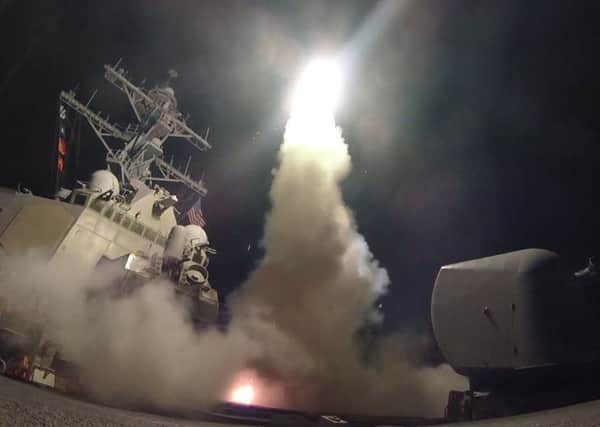YP Comment: Trump raises stakes in Syria '“ President's great military gamble


It is a question made even more profound by the apparent abruptness of President Trump’s volte-face. After all, his previous tweets include “What I am saying is stay out of Syria” and “If Obama attacks Syria and innocent civilians are hurt and killed, he and the U.S. will look very bad!”
Presumably the White House’s new incumbent places a greater premium on the wisdom of his military advisers rather than his campaign rhetoric. After all, he previously taunted his predecessor by saying that Barack Obama would need Congressional approval before unleashing an arsenal like this – backing President Trump did not attempt to ascertain.
Advertisement
Hide AdAdvertisement
Hide AdHowever, while President Trump remains a deeply divisive figure liked and loathed in equal measure, it’s important to consider this issue from his perspective. If he had stayed true to his ‘America first’ instincts, and Syria’s tyrannical dictator Bashar al-Assad had then used nerve gas to kill more young innocents, he would have been accused of weakness.
Yet, by instructing 59 tomahawk missiles to be fired from US aircraft carriers, President Trump risks inflaming, still further, Syria’s never-ending civil war which is further aggravated by Russia’s military presence in the conflict.
Time will tell. If these airstrikes are a deterrent, and do prevent further chemical attacks, the President’s stance wil be vindicated, even more so after his team, and intelligence agencies, sought to minimise civilian casualties with bombs dropped to pinpoint precision and inform allies in advance of America’s intentions which were justified on the grounds of “national security”.
However, while it remains to be seen whether President Trump’s unpredictability is a strength or weakness, foreign policy is at another crossroads with Britain deeply divided over any involvement by this country. Will America attempt to rule by military strength? How will Russia react and what will it mean for the future power struggle between the Kremlin and the White House? And is there any likelihood of President Assad surrendering control of Syria?
Advertisement
Hide AdAdvertisement
Hide AdLike President Trump himself, these are just the latest ‘known unknowns’ to paraphrase America’s former secretary of state Donald Rumseld who was one of George W Bush’s key lieutenants during the Iraq and Afghanistan invasions.
Yet, in many respects, Syria’s bloodbath is a legacy of these conflicts when the attempt by the USA, Britain and others to impose Western values in the aftermath of 9/11 had unforeseen consequences, not least the emergence of the Islamic State terror network.
President Trump needs to recognise this. As recent history shows, airstrikes alone will not suffice – indeed there’s a risk that they will only serve to radicalise another generation of young jihadists. They have to be backed by a concerted diplomatic strategy which is more effective than previous attempts to make sense of a conflict that appeared to be without end when the Assad regime unleashed its latest horror.
Morally, President Trump has possibly acted in the world’s best interests – but the approach is fraught with political and security risks that do have the potential to backfire.
A painful lesson
Advertisement
Hide AdAdvertisement
Hide AdAFTER an unedifying sexism row that eventually led to the resignation of the designate Bishop of Sheffield, the Church of England appears to have learnt a painful lesson.
The anger caused by its nomination of the Rt Revd Philip North, a long-standing opponent of female clergy, was made all the worse given that he had previously stepped aside from an intended appointment as Bishop of Whitby in 2012 after similar protests. The anguish caused in Sheffield, a city where one in three Anglican priests are women, should not have been a surprise.
Following weeks of negative publicity, he withdrew from the role. In this context, it is positive to hear an advocate of women bishops, the Very Revd Dr Pete Wilcox, has now been confirmed as his replacement.
Appropriately, the announcement was made at St Swithun’s Church in Sheffield, whose team rector was one of the first women to be ordained as a priest in Britain and whose parishioners were among the most outspoken opponents of Philip North’s appointment.
Perhaps parishioners and local clergy need a greater say in the appointment process in future to prevent such embarrassments occurring in the first place.